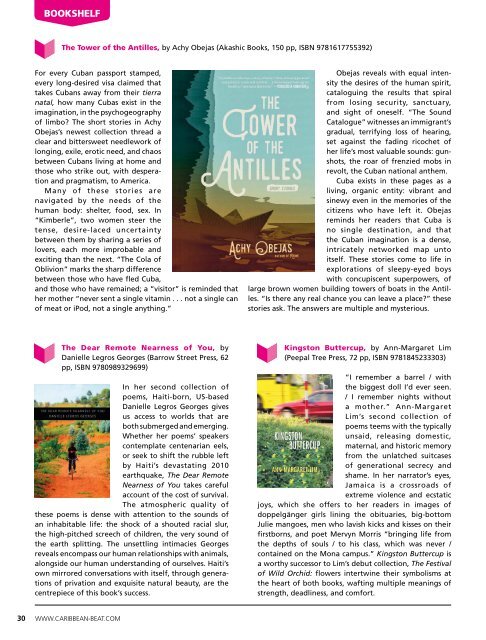You also want an ePaper? Increase the reach of your titles
YUMPU automatically turns print PDFs into web optimized ePapers that Google loves.
Bookshelf<br />
The Tower of the Antilles, by Achy Obejas (Akashic Books, 150 pp, ISBN 9781617755392)<br />
For every Cuban passport stamped,<br />
every long-desired visa claimed that<br />
takes Cubans away from their tierra<br />
natal, how many Cubas exist in the<br />
imagination, in the psychogeography<br />
of limbo? The short stories in Achy<br />
Obejas’s newest collection thread a<br />
clear and bittersweet needlework of<br />
longing, exile, erotic need, and chaos<br />
between Cubans living at home and<br />
those who strike out, with desperation<br />
and pragmatism, to America.<br />
Many of these stories are<br />
navigated by the needs of the<br />
human body: shelter, food, sex. In<br />
“Kimberle”, two women steer the<br />
tense, desire-laced uncertainty<br />
between them by sharing a series of<br />
lovers, each more improbable and<br />
exciting than the next. “The Cola of<br />
Oblivion” marks the sharp difference<br />
between those who have fled Cuba,<br />
and those who have remained; a “visitor” is reminded that<br />
her mother “never sent a single vitamin . . . not a single can<br />
of meat or iPod, not a single anything.”<br />
Obejas reveals with equal intensity<br />
the desires of the human spirit,<br />
cataloguing the results that spiral<br />
from losing security, sanctuary,<br />
and sight of oneself. “The Sound<br />
Catalogue” witnesses an immigrant’s<br />
gradual, terrifying loss of hearing,<br />
set against the fading ricochet of<br />
her life’s most valuable sounds: gunshots,<br />
the roar of frenzied mobs in<br />
revolt, the Cuban national anthem.<br />
Cuba exists in these pages as a<br />
living, organic entity: vibrant and<br />
sinewy even in the memories of the<br />
citizens who have left it. Obejas<br />
reminds her readers that Cuba is<br />
no single destination, and that<br />
the Cuban imagination is a dense,<br />
intricately networked map unto<br />
itself. These stories come to life in<br />
explorations of sleepy-eyed boys<br />
with concupiscent superpowers, of<br />
large brown women building towers of boats in the Antilles.<br />
“Is there any real chance you can leave a place?” these<br />
stories ask. The answers are multiple and mysterious.<br />
The Dear Remote Nearness of You, by<br />
Danielle Legros Georges (Barrow Street Press, 62<br />
pp, ISBN 9780989329699)<br />
In her second collection of<br />
poems, Haiti-born, US-based<br />
Danielle Legros Georges gives<br />
us access to worlds that are<br />
both submerged and emerging.<br />
Whether her poems’ speakers<br />
contemplate centenarian eels,<br />
or seek to shift the rubble left<br />
by Haiti’s devastating 2010<br />
earthquake, The Dear Remote<br />
Nearness of You takes careful<br />
account of the cost of survival.<br />
The atmospheric quality of<br />
these poems is dense with attention to the sounds of<br />
an inhabitable life: the shock of a shouted racial slur,<br />
the high-pitched screech of children, the very sound of<br />
the earth splitting. The unsettling intimacies Georges<br />
reveals encompass our human relationships with animals,<br />
alongside our human understanding of ourselves. Haiti’s<br />
own mirrored conversations with itself, through generations<br />
of privation and exquisite natural beauty, are the<br />
centrepiece of this book’s success.<br />
Kingston Buttercup, by Ann-Margaret Lim<br />
(Peepal Tree Press, 72 pp, ISBN 9781845233303)<br />
“I remember a barrel / with<br />
the biggest doll I’d ever seen.<br />
/ I remember nights without<br />
a mother.” Ann-Margaret<br />
Lim’s second collection of<br />
poems teems with the typically<br />
unsaid, releasing domestic,<br />
maternal, and historic memory<br />
from the unlatched suitcases<br />
of generational secrecy and<br />
shame. In her narrator’s eyes,<br />
Jamaica is a crossroads of<br />
extreme violence and ecstatic<br />
joys, which she offers to her readers in images of<br />
doppelgänger girls lining the obituaries, big-bottom<br />
Julie mangoes, men who lavish kicks and kisses on their<br />
firstborns, and poet Mervyn Morris “bringing life from<br />
the depths of souls / to his class, which was never /<br />
contained on the Mona campus.” Kingston Buttercup is<br />
a worthy successor to Lim’s debut collection, The Festival<br />
of Wild Orchid: flowers intertwine their symbolisms at<br />
the heart of both books, wafting multiple meanings of<br />
strength, deadliness, and comfort.<br />
30 WWW.CARIBBEAN-BEAT.COM


















